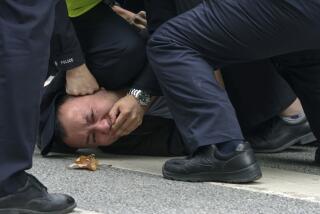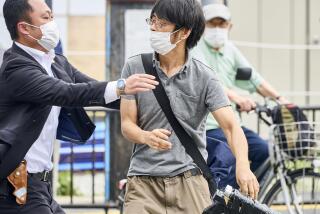China rearms Beijing beat police after series of stabbing attacks
- Share via
Reporting from Beijing — The guns are back in China.
Armed police patrols started rolling on the streets of Beijing on Monday, the Ministry of Public Security announced, in order to protect the city from “armed mobs, sexual violence and terrorist attacks.”
The special patrols, which consist of 150 vehicles with 1,950 police, were launched at a time when police around China are picking up arms again.
Shanghai last month handed out revolvers to 1,000 beat cops, the first time they have had firearms in 60 years.
“The Chinese police will be more like the U.S. It is a long-term trend,” said Xu Jianhua, a former police officer who teaches criminology at the University of Macao.
China has some of the strictest gun control laws in the world, banning even hunting for sports in most of the country. In the 1980s, many of the police forces that still used firearms forced their police to turn them in because the weapons were so frequently misused or stolen. A separate force, known as the Peoples’ Armed Police, is deployed to suppress protests, most notably in ethnic minority areas such as Tibet and Xinjiang.
But most ordinary beat cops have been patrolling with no more than nightsticks, and even those assigned guns are allowed few bullets.
The police forces’ lack of firepower was called into question by a March attack in Kunming, where knife-wielding assailants rampaged through a train station for 40 minutes before four of them were shot by a SWAT team. In all, 33 people were killed.
However, Xu said that President Xi Jinping, who took that office last year, had long wanted to rearm the police.
“Kunming is just the trigger. Xi Jinping had wanted to do this for some time,” said Xu.
The presence of the armed police patrols is seen by some observers as an ominous sign in Beijing, where almost 25 years ago tanks rumbled to Beijing’s Tiananmen Square to subdue pro-democracy protests. In anticipation of the June 4 anniversary, Chinese police already have begun detaining activists.
A lawyer, Pu Zhiqiang, who hosted a small seminar, and Chen Guang, a soldier turned artist who did a performance piece, are among people who were recently arrested for commemorating those killed in the crackdown – even though in both cases the events took place in the privacy of their homes.
“I think it is all related. The general trend is toward more violent suppression,” said Feng Chaoyi, a professor specializing in activist movements at the Sydney-based University of Technology.
In addition to the Kunming incident, blamed on ethnic Uighurs from northwestern China, train stations in Guangzhou and Urumqi have been attacked over the last month. There have been numerous cases of angry men armed with knives slashing schoolchildren.
The debate over police with firearms has loomed large in recent weeks on social media sites and in the press. On a forum sponsored by Ifed.com, readers discussed an incident in Shandong province in 2011 during which four police officers were shot dead and five others injured when they went unarmed to investigate a murder.
Critics warn, however, that arming the police will bring more guns into the country and escalate the existing violence – making China more like the United States.
“In the United States even the civilians can own guns,’’ wrote one microblogger. “If we followed the United States when it comes to the police, does that mean the civilians get guns too?”
For the first time since Shanghai police got guns April 20, an officer on Monday shot somebody – a man police said was suspected of siphoning fuel from parked trucks. He allegedly tried to run a police roadblock and didn’t stop after a warning shot, according to local media.
Human rights advocates are concerned that there will be far more problems with excess use for force than in the United States.
“In China there are many fewer checks and balances and accountability mechanisms. ... The police system itself is known for abuses, so the fact that they will be more militarized will probably bring on some more problems,’’ said Maya Wang, a Hong Kong-based researcher for Human Rights Watch.
More to Read
Sign up for Essential California
The most important California stories and recommendations in your inbox every morning.
You may occasionally receive promotional content from the Los Angeles Times.














